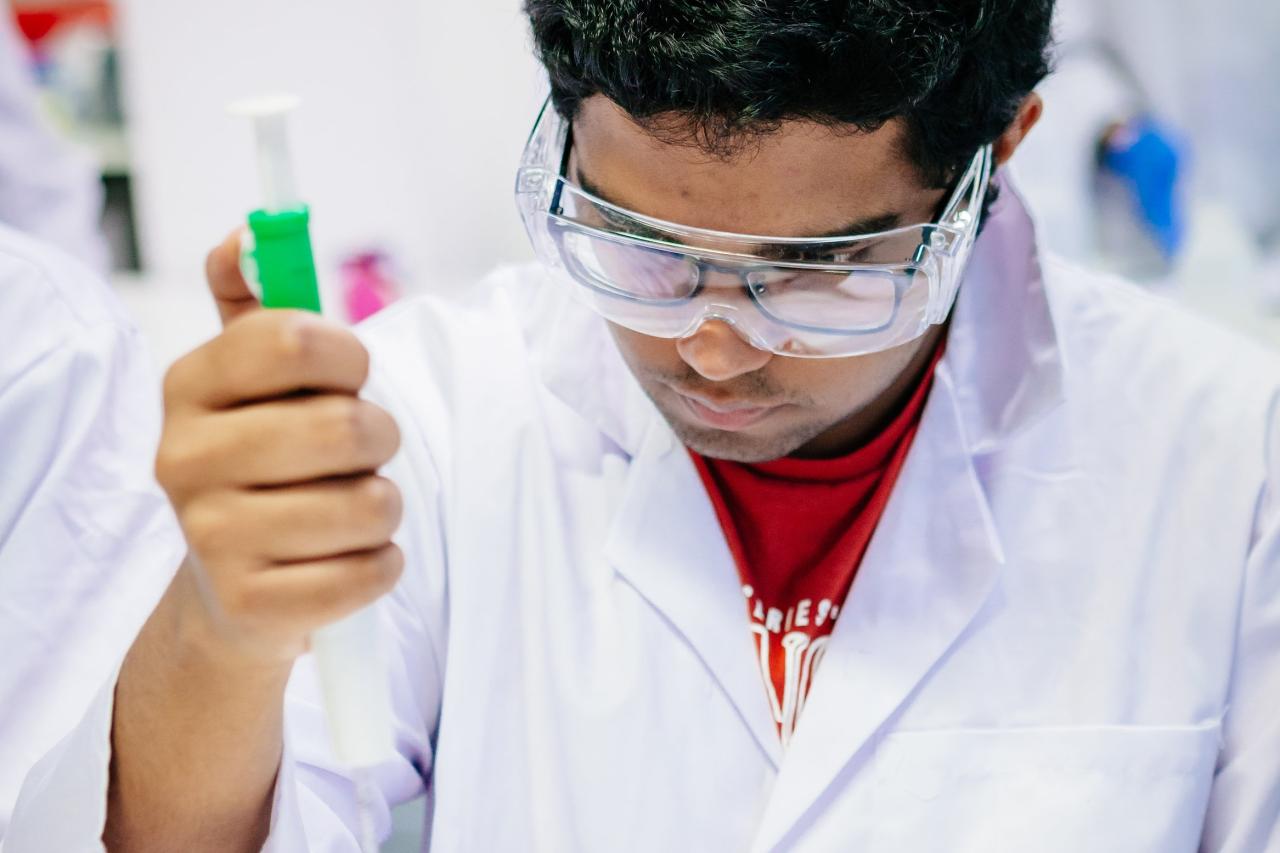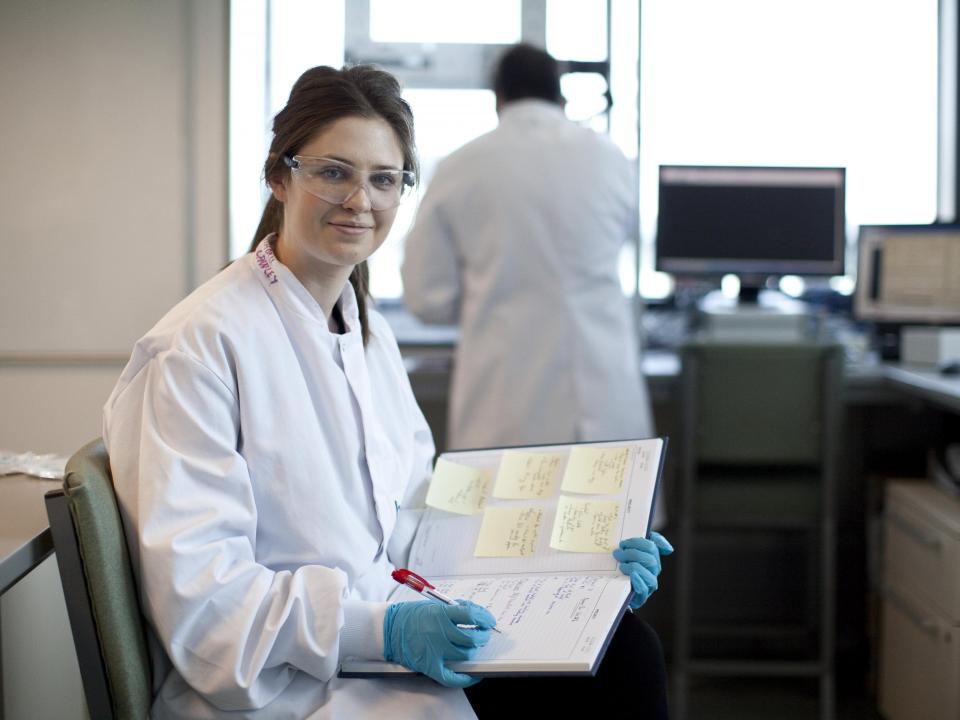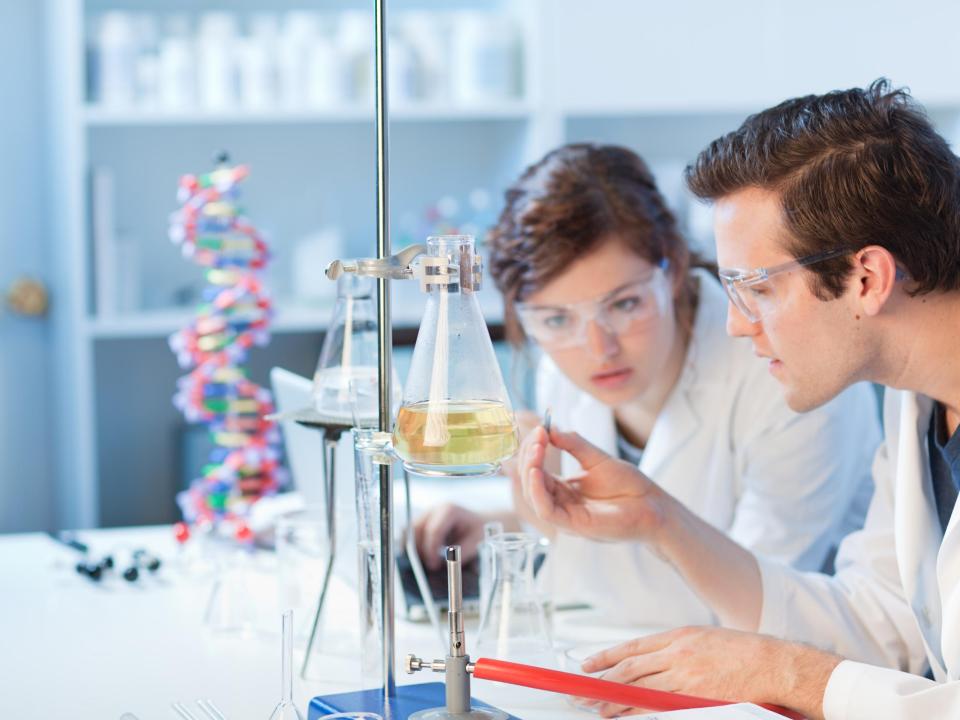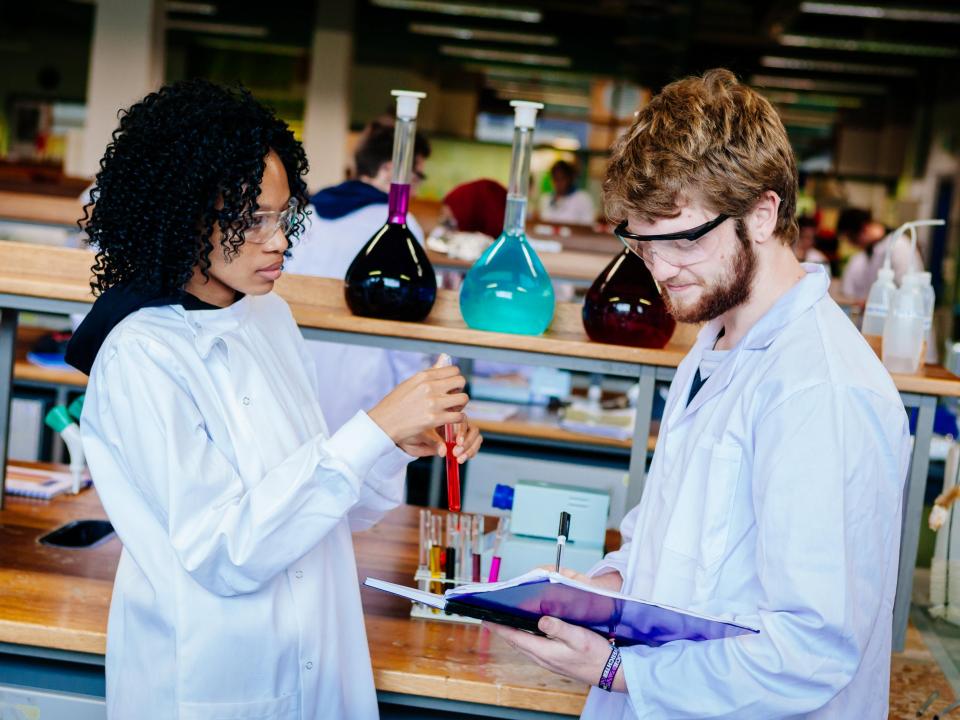Overview
Interested in using scientific analysis to help make a better world? Analytical science is the science of detection and measurement. We benefit from it every day, from purity checks of medicines to industrial waste monitoring or the analysis in forensic laboratories. In a world deluged by data, analytical scientists can help make sense of things and solve problems of critical importance.
During this interdisciplinary course, you will learn both the theoretical and practical aspects of chemical, biochemical and microbiological analysis. In first year, you’ll gain essential background knowledge in chemistry, biology, mathematics and physics, and get hands-on laboratory experience. From second year on, you’ll focus on analytical science and from third year, you’ll specialise in either chemical or biological analysis.
Building real-world capabilities
In third year, you’ll do an INTRA work placement, gaining vital real-world experience. In your final year, you’ll focus on specialised methods and applications, along with a full-time project in the final semester, helping you to develop your own approach to solving complex problems.
As a graduate, you’ll be sought after in sectors such as biopharmaceuticals, public health, cosmetic laboratories, manufacturing, brewing, environmental monitoring, government and education. Typical roles could include process development, validation and quality control roles in contexts such as chemical, forensic and medicinal analysis laboratories, hospital laboratories, medicinal and analytical research and manufacturing plants. You can also choose to continue with further studies in research and development or teaching.
Why DCU
DCU People
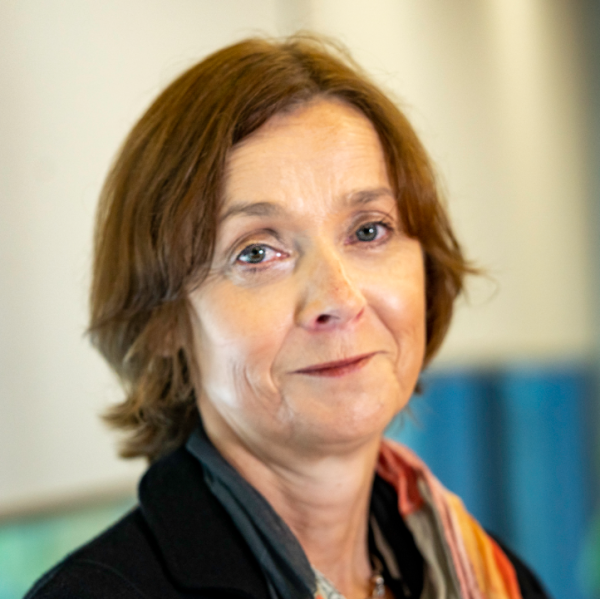
Having graduated with a degree in Analytical Science, I have always been interested in photochemistry and inorganic chemistry.
Read more about Dr Mary Pryce

I was unsure what I would like to do at college so I chose Common Entry Science.
Read more about Olivia Gray
Careers & Further Options
Careers
You will be highly sought after by many of Ireland’s leading companies and public service providers.
Past graduates have gained a variety of positions within Ireland’s growing pharmaceutical and biopharmaceutical industry – in areas such as quality control, product research and development and testing.
Other opportunities include manufacturing industries looking for graduates with strong analytical skills, such as in brewing, agricultural fertiliser production and fine chemicals production.
Graduates have also obtained positions within government agencies involved with environmental monitoring or food quality testing and research. In addition to these, a large number of graduates also choose to undertake postgraduate research.
This course is also suitable for those who ultimately wish to pursue a career in teaching (see www.teachingcouncil.ie for further details).
- Biopharmaceutical
- Education
- Food and Beverage
- Government Agencies
- Pharmaceuticals
DCU graduates are highly sought after by employers. Our Graduates work in environments ranging from large multinationals to SMEs, family businesses and start-ups across every sector.
DCU Careers Service has a number of learning and development initiatives in place for our students, giving them the skills they need for a successful career path.
Entry Requirements
In addition to the general entry requirements for admission to the university the following entry requirements apply
Minimum of O3 or H6 in Mathematics and minimum of O3 or H5 in one of Physics, Chemistry, Biology, Physics with Chemistry, Agricultural Science or Computer Science.
In addition to the general entry requirements for admission to the university the following entry requirements apply
GCE A Level D or GCE AS Level C or GCSE B Mathematics and GCE A Level D or GCE AS Level C or GCSE B in one of Physics, Chemistry , Biology or Agricultural Science
GCE A Level general entry requirements can be found here: http://www.dcu.ie/registry/entry.shtml. Please note these may vary slightly for some programmes
Please visit our Admissions webpage for details on course requirements or how to apply to DCU.
Please visit our QQI FET webpage for details on DCU courses, open days, campus tours or school visits.
To apply to DCU, please visit www.cao.ie.
Mature entry is a competitive process. Applicants must demonstrate:
- a genuine interest in the programme(s) they are applying for
- academic experience and competency in their chosen field of study
- an ability to engage and succeed on the programme
All applicants must complete a statement of interest to be considered for the mature application route.
For further guidance on the mature application process please see the CAO Website
Applicants that have completed at least one year of study at NFQ Level 6, 7 or 8 at another institution may apply to continue their studies on a similar programme at DCU. There should be substantial overlap in content between the two programmes to be considered for a transfer. Results and other supporting documentation must be submitted to CAO by the closing date of 1st July. This is a competitive application process for a small quota of advanced entry places. Offers are made on a rolling basis until all places are filled. Early application is advised. Please note: Applicants should also consider applying through the appropriate route for first year entry to the programme they are interested in. This application process is only for advanced entry.
International candidates are expected to have educational qualifications of a standard equivalent to those outlined above. In addition, where such candidates are non-native speakers of the English language they must satisfy the university of their competency in the English language. For further information on international applications click here.
Course Structure
- Chemistry, Physics and Biology Laboratories
- Mathematics
- Chemistry
- Biology
- Interdisciplinary Science
- Physics
- Biomolecules and Metabolism
- Microbiology and Genetics
- Spectroscopy and Physical Chemistry
- Kinetics and Thermodynamics
- Organic and Inorganic Chemistry
- Visualisation and Validation
- Mathematics
- Inorganic, Organic and Physical Chemistry Laboratories
- Spectroscopic Workshop
- Biochemistry and Microbiology Laboratories
- Environmental Monitoring and Forensic Biology
- Physiological Systems and Cell Biology
- Bio-analytical Laboratories
- Separation Techniques
- Analytical Spectroscopy
- Regulation and Data Analysis
- Analysis of Organic and Inorganic Species
- INTRA
Chemistry Pathway
- Organometallics and Polymer Chemistry
Biology Pathway
- Advanced Cell Biology
- Advanced Spectroscopy
- Genetic and Pharmaceutical Analysis
- Advanced Spectroscopic Workshop
- Biopharmaceutical and Immunological Analysis
Year 4 Options
Chemistry Pathway
- Interfacial and Supra-molecular Chemistry
- Analytical Applications
- Soil, Energy and Waste
- Literature Survey
- Project
Biology Pathway
- Gene Cloning and Gene Expression
- Industrial Bioprocessing
- Bio-analytical Laboratories
- Literature Survey
- Project
Fees and Funding
Fees
How To Apply
Applicants presenting EU School Leaving/FETAC Level 5 examinations: Apply through the Central Applications Office (CAO) by 1st February or 1st May
To apply for this programme:
Candidates should apply directly here. Here's a quick step by step guide if you need help with your application.
Please provide
- Academic Transcripts for each and every year of study with English translation, if applicable.
- If applicable, provide evidence of competence in the English language as per DCU entry requirements.
Applications are accepted on an ongoing basis up to 1st July. All Non-EU candidates are advised to apply early, as places are limited.
All mature applicants apply through the CAO by 1st February. For further information and for special application procedures for mature students, please click here
EU applications are made via the CAO Advanced Entry route which will open on the 5th November to 1st July.
Please see Application Procedures or E-mail ugadmissions@dcu.ie.
Candidates submitting EU examination results required to apply through the CAO can apply online at www.cao.ie. Candidates can also apply via DC163 Chemical Sciences General Entry at www.cao.ie
Candidates submitting non-EU examination results are required to apply directly here.
Life On Campus
At DCU, our students can expect a unique campus experience. We are known for our excellent teaching and learning facilities, our active clubs and societies, and our great social and sporting facilities. All this makes DCU an exciting place to be.
DCU has three academic campuses; Glasnevin, St. Patrick’s and All Hallows (both in Drumcondra), all close to Dublin City centre.
They can be reached by public transport, Dublin Bus and Bus Éireann, with our Drumcondra campuses a ten minute walk from Drumcondra Train Station. Glasnevin is a 20 minute walk from St Patrick’s and All Hallows. They are also linked by Dublin Bus.
Each campus has a library (O’Reilly, Cregan and Woodlock Hall), study spaces, restaurants, and on-campus residencies. There are sports facilities on Glasnevin and St. Patrick’s, and there is a dedicated sports campus, St Claire’s, located near Glasnevin on the Ballymun Road.
DCU’s 19,000 students have access to exceptional teaching and learning facilities across our three academic campuses.
These include modern learning theatres, research centres, a new media and TV studio, radio/podcast studios, computer suites and advanced labs in the areas of Languages, Engineering, Physics, Chemistry and Biotechnology, as well as a Sports Performance centre and a training hospital ward. In 2021, we opened our first virtual reality ‘Leadership Lab’, which is located in our Business School.
We continue to improve and update our facilities. For example, construction of a new world-class STEM facility is underway on the Glasnevin campus. With capacity for an extra 3,000 STEM students, this facility will advance DCU’s international reputation for excellence in science and health, computing and engineering disciplines.
Studying in DCU isn’t just about course work. The university is rich in student life and activities.
There are more than 140 clubs and societies for students in DCU, with ‘Clubs & Socs’ days taking place on both the Glasnevin and Drumcondra campuses at the start of the academic year. They span everything from rugby to rock climbing, anime to jazz.
For many students, sport is an important part of the DCU experience. DCU’s Sports Complex boasts a 25 metre swimming pool, fitness centre gym, all-weather pitches and squash courts, as well as soccer, GAA and rugby pitches. DCU Dóchas Éireann, the university’s GAA club, is the largest third level Gaelic Games club in the country. Meanwhile, DCU Athletics has been Ireland’s highest achieving university club for many years. And DCU has dozens of other clubs to get involved in, from Archery to Weightlifting.
The Glasnevin campus is home to our purpose built, state-of-the-art student centre, The U, which serves the needs of a rapidly growing student body. Here, you will find the Student Leadership and Lifeskills Centre, performing arts and cultural spaces for students and the wider community, and the Entrepreneurship and Innovation Hub. Also located on our Glasnevin campus is The Helix, our renowned performing arts centre.
On our St Patrick’s campus, we have the Java Student Hub, a vibrant, warm and welcoming space where students can meet for coffee, play music, use the projector to watch events, or just relax. The walls of the Java Hub were designed based on the cultural history of St Patrick’s Campus, including the special references to the notable sporting history and history of the arts.
We have a number of academic, professional and social supports for students.
Student Advice & Learning Skills Centre - Offers a wide range of supports and services to students and advice
The Writing Centre - drop-in writing workshops for students through the academic year
Maths Learning Centre - provides maths support for students of all ability levels with maths modules
Student Learning - facilitate the transition from passive to active learning for students at DCU, by teaching study skills, nurturing critical thinking and building student confidence.
Careers work with students to help them on their professional journey into graduate employment.
Our student support team offers a comprehensive support programme, helping students make that all important transition into university life and focusing on building confidence and skills which are key to success at third level.

DCU Glasnevin Campus
FAQs
Is DCU all one campus?
DCU is a multi campus university - the Glasnevin, St Patrick's and All Hallows campuses. The St Patrick's campus is where the Education courses are taught and some of the subjects from the BA Joint Honours degree. There is a 20-25 minute walk between the campuses but there are buses and bikes available to go between them also.
Click here to see maps of all of our campuses
If I'm studying on the St Patrick's campus, can I use the library and sports centre on the Glasnevin campus?
Yes, all facilities such as sports and accommodation are open for all DCU students to avail of.
Are there libraries in DCU and if they have wifi and work stations?
We have a brand new state of the art four floor library on our St. Patrick's Campus which complements the existing library on the Glasnevin campus. There is free wifi, work stations as well as desktop computers.
Does DCU provide accommodation?
DCU does have on-campus accommodation for undergraduate and postgraduate students, and you can find out more and apply via the Accommodation Office webpage.

